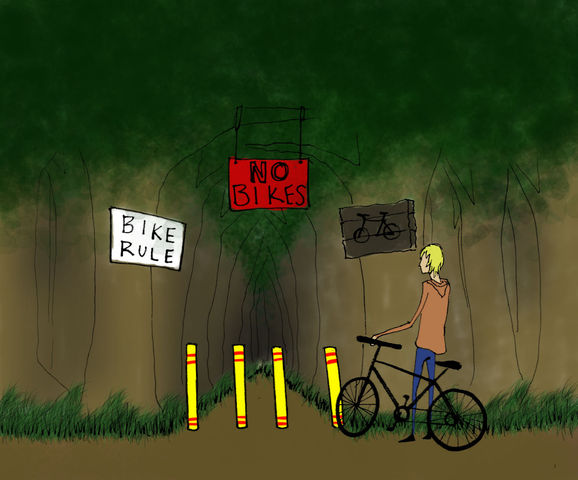In 2007, the chief of University Police introduced the “No Riding” Policy here at Chico State. The policy restricts riding any sort of vehicle on campus. The policy specifically targets bicycles, skateboards, roller blades and scooters.
At first this rule seems a little unwarranted. How big of a deal is it that people ride their bikes on campus? Is this really an issue that deserves our concern? For how much time I spend on campus, I practically never see a situation where someone has been harmed due to a person riding a bike, let alone a skateboard or roller blades.
Except the problem with this logic is that I’m not accounting for the “No Riding” Policy. I never see anyone harmed from a bike on campus, and this is because of the policy.
How much worse would it be if people were free to ride all over campus? The truth is that it would probably become a severe problem.
Chico State’s current enrollment is higher than ever. With close to 4,000 bikes on campus, you could imagine how out of control it could potentially become.
Chico State has more than 40 locations on campus for students to lock up their bikes. The campus isn’t very large to begin with — about 119 acres. So it’s very reasonable for people to lock up their bikes and easily walk across campus. The great thing about Chico’s campus is that it’s small enough to where you don’t need to ride through campus. You can place your bike next to the Student Services Center and make it across campus to Modoc Hall within five minutes. Chico also has many bike paths that run through campus for students to use.
Some people would try to point out that the punishment for riding on campus is too severe for such a minor issue. That may have been true in the past, but thankfully University Police updated the policy to have a much lighter punishment.
The policy used to say that students would pay up to $200 in fines and have to make a court appearance for riding on campus. Now the policy says that students could pay as little as $60 and have to take a 45-minute online course. Most officers are pretty lenient with the “No Riding” Policy anyways and typically let students off with a warning.
What is a problem, though, is that students can get in trouble for not having their bikes registered with University Police. If a student is caught riding through campus, not only can they face punishment for riding, but there may also be some repercussions for not having the bike registered under your name. The fee for not registering your bike doesn’t exceed $10, but there arguably shouldn’t be a punishment for that to begin with.
Having your bike registered is useful if your bike gets stolen or if there is an issue on campus with how your bike is locked up, but it shouldn’t be forced upon someone who doesn’t feel like going through the process. Registering your bike should be encouraged, but it shouldn’t be enforced, and there certainly shouldn’t be any sort punishment for not registering.
The biking policy comes off a little intrusive at first, but the truth is this rule is probably for the best. While not that many people ride through campus now, if it was OK for everyone, it could escalate quickly into something most students would abuse.
Jeff Guzman can be reached at orionopinioneditor@gmail.com or @theorion_news on Twitter.








Wanda Redman // Apr 22, 2016 at 2:26 pm
When the author spoke about not being forced to register your bike, I think he should look at the California vehicle code section about bike registration. Also, why would you spend anywhere from $150.00 to $1,000.00 for a bike and not spend another $10.00 to register it? What will you expect the police to do without a bike license or the bike’s serial number? Why would you even waste their time to complete a police report, especially when you didn’t make the effort to help protect your property? And, for the few times that I’ve been on campus, I have been just about knocked to the ground by some irresponsible skateboarder.